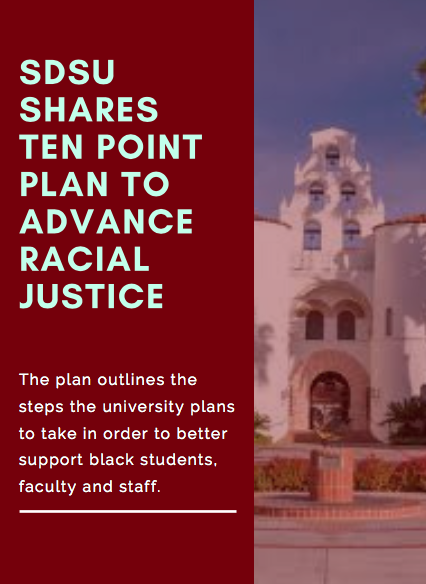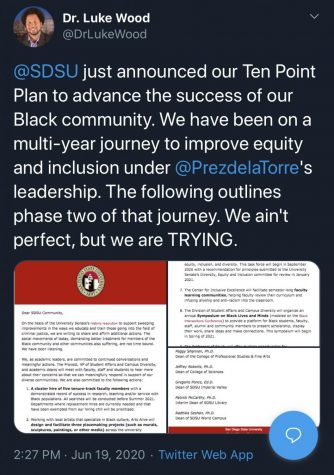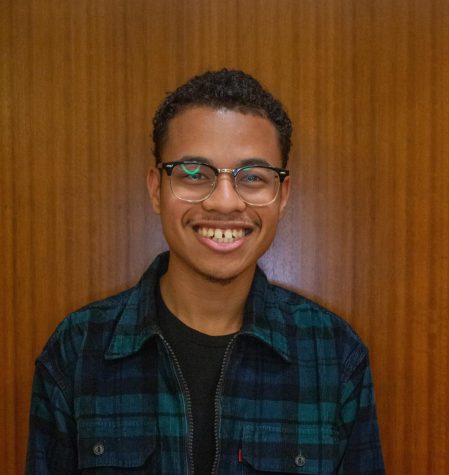
On the 155th anniversary of Juneteenth, San Diego State released a Ten Point Plan which outlines the steps the university plans to take in order to better support black students, faculty and staff.
The plan follows the recent University Senate resolution which added an additional focus on race-relations and policing for criminal justice majors.
SDSU, according to the resolution, said additional action was needed in order for change to extend to all facets of the university.
“The social movements of today, demanding better treatment for members of the Black community and other communities also suffering, are not time bound,” the resolution states. “We have been listening.”
Vice President for Student Affairs and Campus Diversity Dr J. Luke Wood said the resolution was a good first step, but there is still more to be done.
“We recognize that (the resolution) works to address one aspect of the problem but the larger issue facing the Black community as San Diego State and elsewhere really requires a more comprehensive approach,” Wood said.
Taking the steps from a criminal justice course requirement to a campus-wide plan is the university’s way of signifying not only do black lives matter, but “black minds matter too” Wood said.
The steps in the 10 Point Plan include:
- A cluster hire of five tenure-track faculty members with experience teaching/servicing Black populations
- The creation of three on-campus art projects (murals, sculptures, etc.) that highlight black history and culture
- College diversity plans will be shared publicly
- Each department will review and redevelop coursework and curricula to advance racial and social justice
- The expansion of the Knowledge Exchange Empowerment Program
- The establishment of a Presidential Task Force to develop “Principles of Community”
- The creation of faculty learning committees
- The organization of an annual Symposium on Black Lives and Minds
- Professors of Equity will offer opportunities for professional learning
- Town Hall meetings held twice a semester to report on the progress and success of the aforementioned initiatives
Creating the 10 Point Plan was a largely collaborative effort Wood said. Community members and university officials held multiple meetings to develop a larger list of items that was eventually scaled down to the ten items most impactful.
Wood said the cluster-hire is the university’s current main focus as well as the review of curricula across departments.

“We’re looking at what we are teaching,” Wood said. “Does it deal with issues of anti-racism. anti-blackness, cultural competency, and basically developing coursework that helps to ensure that we are better preparing all of our students to engage Black communities here and abroad.”
Wood said the 10 Point Plan distinguishes SDSU from other similar institutions because it takes action on behalf of the Black community, as opposed to simply putting out a statement.
“If you look across the country on how institutions have responded to these issues, the most an institution has really done is public statements from the president or maybe listening sessions, healing circles, things along those lines,” Wood said. “All that’s important but if there’s no action that goes along with it it’s just words. I think we’ve created a model for institutions across the country to look at and see what real action looks like. I see this as a monumental effort.”
Wood said he has received feedback from hundreds of schools across the country asking for copies of the plan and he said many have expressed to him that the 10 Point Plan is inspiring them to create change in their own institutions.
“We see this as a much larger effort and so San Diego State is fortunately out in front in trying to create a different pattern than what we see at most institutions,” Wood said. “That doesn’t mean we’re perfect, but we’re trying.”
Associated Students President Christian Holt said the plan is an important step in the right direction; although, he added that Africana Studies and other cultural/identity-based programs are often underfunded. Holt said he would like to see an increase in funding of such programs.
“The impact of continuing (Diversity, Equity and Inclusion) planning throughout all university departments and curricula as well as the hiring of five tenure-track faculty will have a significant impact on how underrepresented students perform academically as well as create a safer learning environment,” Holt said.
Holt said the changes to be made at SDSU through the plan hold very personal meaning.
“Many Black students, including myself, have faced microaggressions from being the only group in a science classroom asked to spread out, being looked at when the topic of race and or racism comes up, and sitting through inappropriate jokes,” Holt said. “These are just a few instances I have personally faced, and I think with the integration of this plan teachers and students will be more culturally aware and make the educational experience more welcoming for underrepresented populations.”
Non-Black students and staff looking to support Black students should focus their attention on self-educating and direct action, according to Holt.
“The most important things that our non-Black staff and peers can do to support Black students are educate themselves on the Black experience in America and speak up for us in situations of injustice,” he said.
For more information on the 10 Point Plan visit https://diversity.sdsu.edu/about/statements_cdo.











